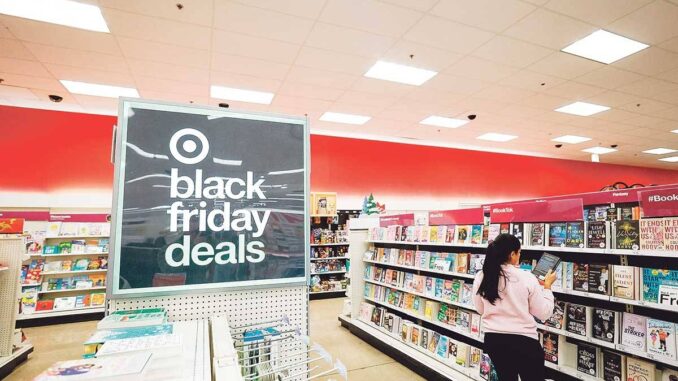
WASHINGTON, D.C. — US consumer confidence improved in November, according to survey data released on Tuesday, boosted by greater optimism surrounding the labor market.
The Conference Board’s consumer confidence index rose to 111.7 this month, up from 109.6 in October, marking an increase for a second straight month.
“November’s increase was mainly driven by more positive consumer assessments of the present situation, particularly regarding the labor market,” said Dana Peterson, chief economist at The Conference Board.
GETTING BRIGHTER A woman shops at a Target store in Chicago on Nov. 26, 2024, ahead of the Black Friday shopping day. The Conference Board released a report from a survey conducted, which said US consumer confidence improved in November. AFP PHOTO
Consumers were “substantially more optimistic” about job availability in the future, which reached its highest level in around three years, she added.
“Consumers’ expectations about future business conditions were unchanged, and they were slightly less positive about future income,” she said in a statement.
The improvement in November also came amid higher confidence for younger consumers under the age of 35, the survey found.
Meanwhile, a smaller proportion of consumers expected a recession in the next 12 months reaching the lowest level since July 2022 when the question was first included in the survey.
The expectations index, reflecting consumers’ short-term outlook for income, business and labor market conditions, picked up 0.4 point to 92.3, above the threshold of 80 signaling a recession ahead.
But Robert Frick, corporate economist with the Navy Federal Credit Union, cautioned that despite improved sentiment about the job market, “the numbers don’t bear that out.”
“Job openings continue to trend down, and the ‘quits rate’ shows workers tending to stick with their current employers,” he warned in a statement.
Pantheon Macroeconomics chief US economist Samuel Tombs added in a note that the increase in consumer confidence overall “likely was driven by euphoria among Republicans.”
“The index also jumped in late 2016, when Mr. Trump was elected for the first time,” he said, referring to President-elect Donald Trump’s victory at the polls this month.


Be the first to comment